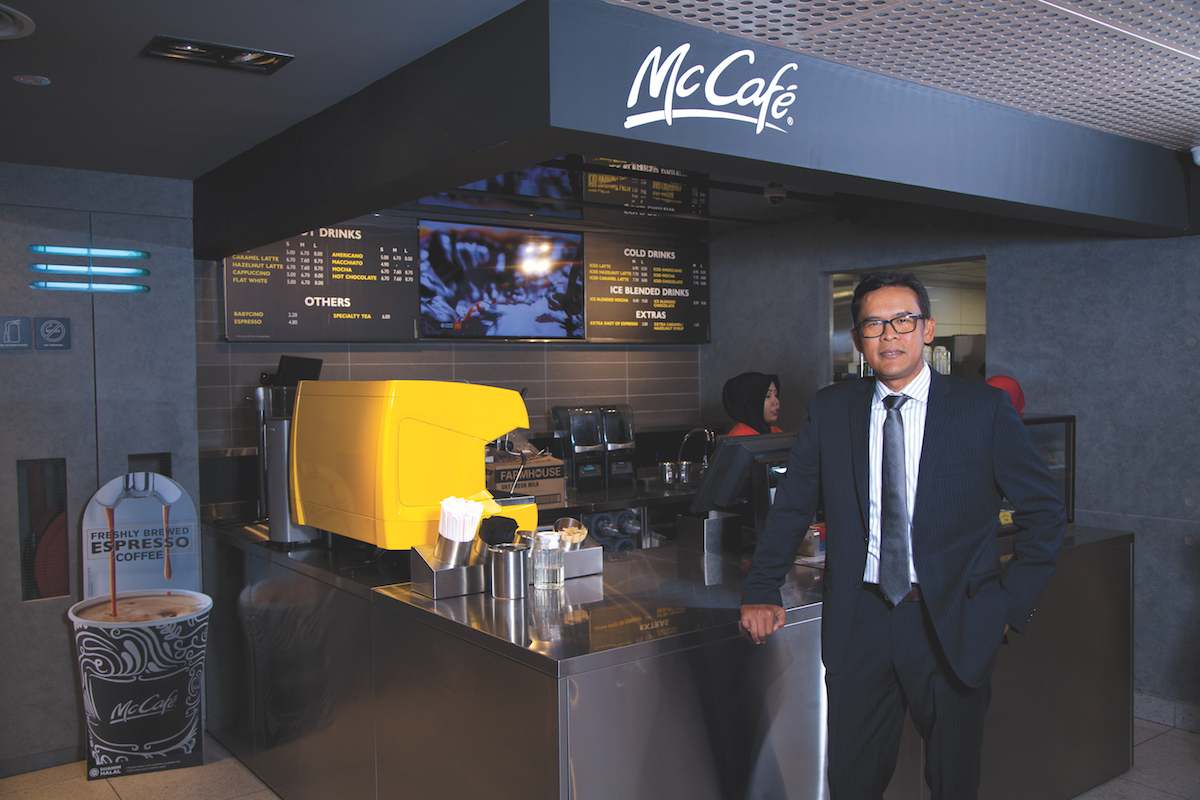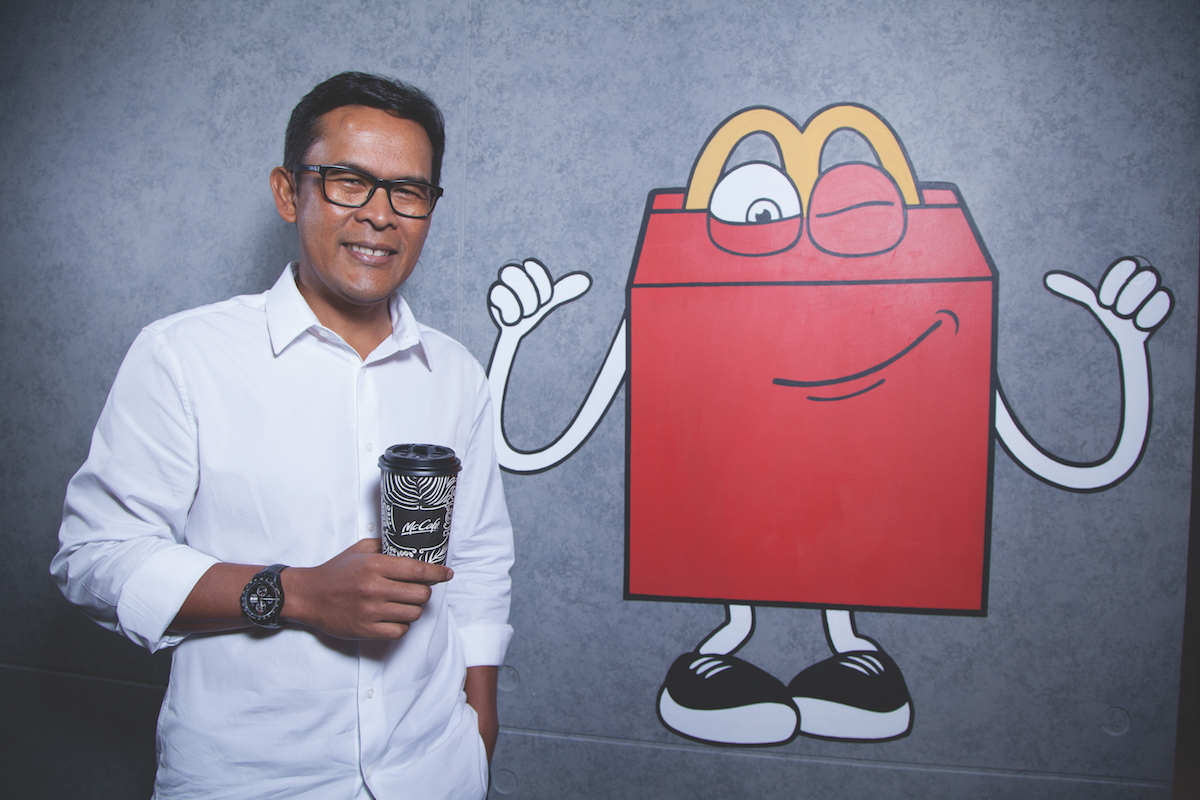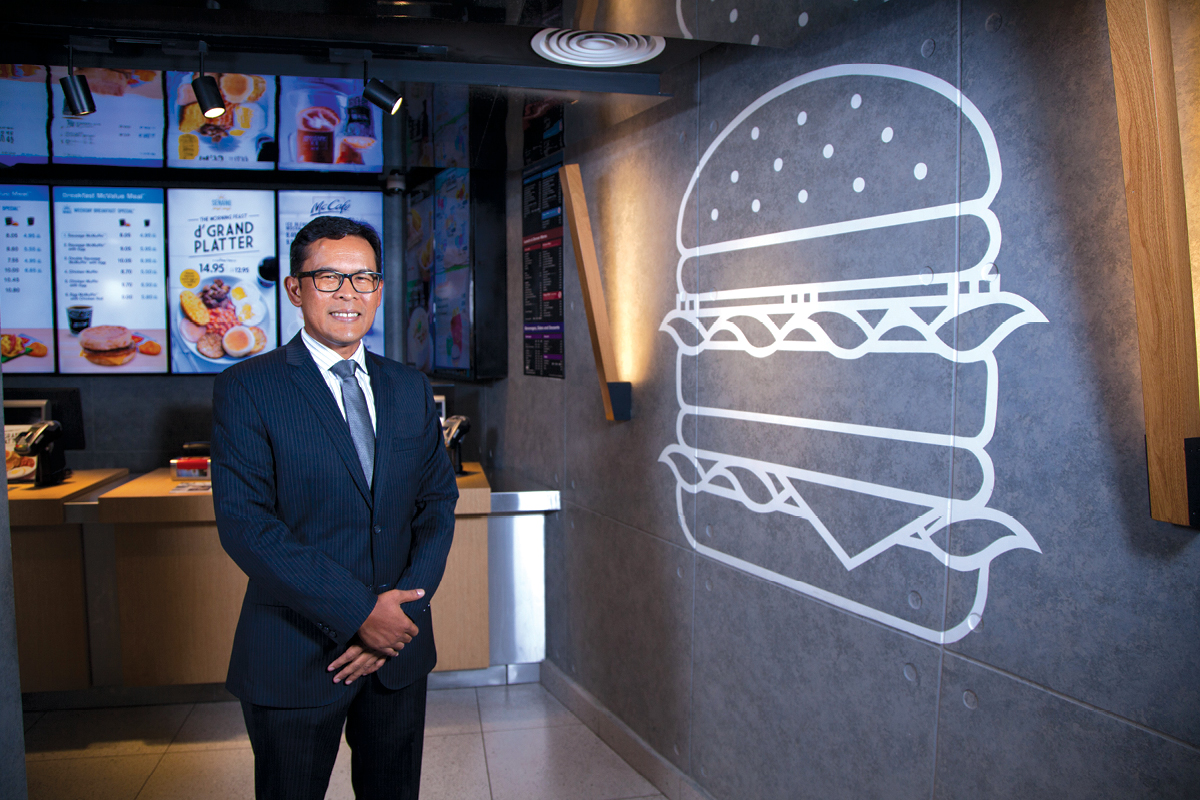Few people know the nuances of uber-successful fast food retailer McDonald’s like Azmir Jaafar. After completing a degree in dietetics and clinical nutrition at the University of Georgia, Azmir joined McDonald’s as a management trainee in 1993 for what he describes as his “first real job”. He has been with the company ever since.
Just one year after joining, he moved into Real Estate Development for the organisation, spending 12 years there while completing an MBA at the University of Bath and progressing to the higher tiers of management. “When I came on board, it was a small company and I had to multi-task,” Azmir says of his early days. “Even when I was a junior, I was able to get involved in senior roles and be coached by senior managers. There were great opportunities.”
In 2006, he was given the job of Managing Director at McDonald’s Malaysia. He drove double-digit sales growth, oversaw an increased rate of restaurant openings focusing on drive-through restaurants and brand extensions such as dessert kiosks, and manoeuvred 24-hour restaurant and delivery services.
Driving growth
During this time, McDonald’s Malaysia was also recognised for best practice in drive-through development throughout emerging markets in Asia–Pacific, the Middle East and Africa. Even more impressive, the restaurant base grew 300% during his tenure.
The company has also given Azmir opportunities to travel and work in very different markets. After his initial success in Malaysia, Azmir was deployed to China, where he stayed for six years and oversaw the opening of more than 1,000 new outlets.

At the same time, he also helped oversee the India markets as Vice-President, Regional Development. He then spent a year in Dubai, where he was responsible for the Middle East and African markets. In August 2015, Azmir returned to his native Malaysia to once again take up the Managing Director role.
Over the past two years, Azmir has helped guide McDonald’s Malaysia through a digital transformation. The company has embraced new technology, being one of the first restaurants in Malaysia to offer cashless ordering nationwide.
However, this growth has occurred in a market not without its challenges. In recent years, Malaysia has enjoyed some of the lowest unemployment rates in the world, which sometimes dip to just 2%–2.5%. This means there is a limited pool of job seekers to draw on and Azmir says that recruiting the best young employees is critical to McDonald’s Malaysia’s plan. “We employ a lot of part-timers, including school leavers. We also have a lot of full-time employees, but that is the nature of the business.”
Attracting young school leavers
McDonald’s Malaysia is currently working with the Ministry of Human Resources Malaysia to attract young school leavers to join its industry-oriented training program, which will enhance their competency level and earn them an industry-recognised certification.
“We want to convert students to long-term employees and have them learn our values of hospitality, friendliness and productivity at a young age. That is always a challenge, developing employees at an early stage in their careers.”
“People’s perception of McDonald’s jobs is not always positive at first, but once they get in, experience the family atmosphere, and make friends, they see there are opportunities and want to stay long-term.” Azmir says McDonald’s Malaysia is a great place for young people to work and points
to its numerous Best Employer awards.
Best employer for women
With half of its managers being female, the quick service restaurant (QSR) chain has collected an award for Best Employer for Women and holds a strong record on gender equality. Azmir is also particularly proud of its special recognition prize as the leading employer of gen Y Malaysians, showing its inclusive approach to recruitment and retention.
Azmir says the opportunities for career advancement were a major reason he initially chose to work at the company. Today, it remains a key part of what makes McDonald’s a desirable employer. “We have many employees who have been with the company since day one. Our Operations Directors began flipping burgers with us.
A lot of people who are in a crew position today will go on to become restaurant managers in the next couple of years.”
Classroom training is also important in encouraging staff retention. “Throughout the year, staff will be part of an ongoing development study program – we call it Hamburger University. Employees definitely value opportunities like these and the chance to learn about other positions and progress through the company.”
Azmir makes a point of telling his staff that how far they advance in McDonald’s Malaysia will be based on qualities like ambition and hard work. “It’s nothing to do with whether you are a shareholder or something; there will be opportunities if you contribute.” This lesson is given credibility by his own rise from humble roots to the upper tiers of management. “I came from a rural area and was able to make good progress.”
Understanding the market
McDonald’s Malaysia has not adopted the approach of entirely replicating its hugely successful American parent company. Instead, it has sought to understand the Malaysian market and localise the product range.
It became the first QSR to be certified for complying with the halal regulations set by the Department of Islamic Development Malaysia, and trains staff and suppliers on meeting these requirements.
Azmir says there are core items such as Big Macs and Quarter Pounders that are on every McDonald’s menu around the world, but McDonald’s Malaysia has introduced its own specialties like the Bubur Ayam McD (chicken strips in rice porridge, with chilli and fresh shallots) and Ayam Goreng (fried chicken). “The top three sellers are spicy menu items. Malaysians like spicy food and we try to make flavours relevant.”
One chicken burger, the Double Spicy McChicken Deluxe, was so hot that customers were challenged to film themselves eating it without having a drink to help soothe their mouths. Anyone who successfully finished the Deluxe without taking a sip of drink and broadcast it on Facebook Live, received a free burger for their trouble. While seemingly a novelty, this promotion is also an example of McDonald’s Malaysia adapting its menu to suit local tastes and embracing a new digital era through social media.
Beyond shaping the menu, a deep understanding of Malaysian demographics has enabled the company to choose locations for new restaurants and develop its business model. “Malaysia has big families,” Azmir explains. “When we talk about family in Malaysia, we talk about all three generations – children, parents and grandparents. So, it’s important to include the elderly and give that space to families who are big and close-knit.”
Similarly, Malaysia’s heavy car usage has played into how new restaurants are located and built. “Malaysians drive a lot, so we opened a lot of drive-through outlets. There is not much reliance on public transport, so we kept this in mind when we were developing the restaurants.”
The feedback app
McDonald’s Malaysia also embraces new technology to communicate with customers. The MY McD Feedback app gives instant customer feedback to the restaurant manager, the supervising manager and to Azmir. “We really believe in being customer-centric. We’re very involved in customer feedback and can react to it quickly,” says Azmir.
A new app, scheduled for release this year, will be based around rewarding customer loyalty, while McDonald’s Malaysia is also considering partnering with food aggregators for new online delivery options to ensure it remains relevant in a rapidly changing QSR industry.

Azmir says McDonald’s Malaysia also has aggressively remodelled its restaurants as part of its digital transformation. “It’s a complete overhaul with a new look and improved audience focus.” These updated outlets include self-service kiosks which, Azmir says, cater to a range of needs. “Some customers do not like face-to-face transactions, so they can order without it. Customers can also personalise their orders.”
In addition to its strong focus on the customer experience, McDonald’s Malaysia has forged strong, long-term relationships with suppliers. One of its core values is the ‘three-legged stool’ business model, where each leg of the stool represents a stakeholder group, namely, suppliers, employees and franchisees. For the stool to be stable, all legs need to be equally strong and connected.
Steady, ongoing relationships with suppliers are critical to operational excellence. “For new suppliers, we think long-term,” Azmir explains. “Whenever we come across a new opportunity for someone to come in, we ensure they understand our model and embrace those values. Once suppliers have come on board, McDonald’s Malaysia » encourages them to communicate openly.”
Azmir attends a town hall meeting with suppliers and employees each quarter and approaches these get-togethers as an opportunity to learn. “We take all direct feedback, whether good or bad, and that keeps the ‘three-legged stool’ strong.”
Azmir also attends the biannual McDonald’s conventions in Orlando, Florida, where up to 15,000 managers, suppliers and franchisees converge to discuss the latest developments in the company, hear from senior leadership and recognise outstanding performers. More than 100 countries were represented at the 2016 conference, so the company developed its own Facebook-style interactive newsfeed to keep the delegates across all the action.
Navigating competition
Such gatherings are also an opportunity to discuss new competitors. Azmir says McDonald’s Malaysia is facing vigorous competition, and not just from other QSRs, but also convenience stores. “They offer ‘grab and go’ food at very competitive prices. We have seen their influence in places like Japan, Taiwan, and even China. We can offer the whole experience – the ambience and hospitality. They can’t offer that. But I think they will be a key challenger over the next three to five years as we look to expand.”
We have many employees who have been with the company since day one. Our Operations Directors began flipping burgers with us.
How McDonald’s Malaysia navigates such competition will be crucial in whether it reaches its ambitious goal of having 450 outlets by 2025, a massive jump from their current number of approximately 270 restaurants. This aggressive expansion comes with a commitment to invest RM1.4 billion over the next decade to introduce these new stores. The expansion is also projected to create around 10,000 new jobs for locals. Azmir has described this massive expenditure as a resounding vote of confidence in the country’s future.
Azmir says that the location of the new stores will be based on a detailed analysis of the market. McDonald’s Malaysia is already active in this space, having carried out a number of market segmentation studies.
“We undertake these studies to help us understand what drives consumer needs and behaviour,” he explains. “We do this on an ongoing basis and try to use it to increase the value of new promotions and see how customers feel about them.”
McDonald’s Malaysia remains a forward-looking company and will continue to embrace new technology and keep a close eye on local trends and customer feedback as it chases aggressive growth. However, this will all be done with McDonald’s core values, as symbolised by the ‘three-legged stool’ concept, kept front of mind. “This culture has been part of McDonald’s as long as we have,” Azmir explains. “It is part of our DNA as a restaurant and it is very important that we work together as a team.”

